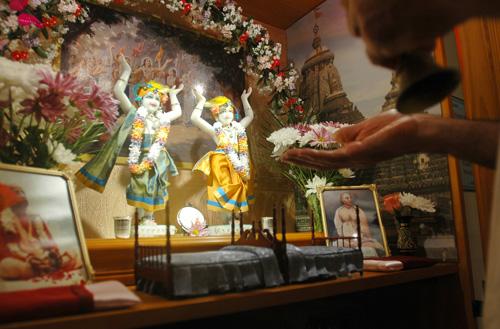Devoted to the divine

Before going to sleep, Prithu places two small beds in front of Shri Nityananda Prabhu, on the left, and Shri Chaitanya Mahaprabhu, on the right, who stand on the altar in their living room. These two idols represent the latest incarnation of Krishna, 500 ME Online
Mar 12, 2007
Editor’s note: This is the second of a two-part photo essay that explores the lives of the Urbana Hare Krishnas. The photographer followed the group for four months, attending services, festivals and celebrations, as well as events in the founders’ daily lives.
Prithu stands on his lawn raking leaves into a large pile at the foot of the Krishna Center’s driveway. As I walk up to the scene, I am surprised to find a Krishna devotee raking leaves off the lawn, because I have always thought that raking leaves is an unnatural and Western way of maintaining one’s yard.
“Why are you raking the leaves off your lawn?,” I ask as I approach Prithu.
“The dead leaves will suffocate the grass underneath if they are not removed,” explained Prithu, simply.
“We’re just ordinary folks,” he says with a shrugging grin.
Get The Daily Illini in your inbox!
After spending four months studying Danakeli dasi, Prithusrava dasa, and the Krishna Center of Urbana, I have realized how much this explanation of raking old leaves to keep new grass growing reminds me of the metaphorical verses of the Krishna holy book, the Bhagavad Gita.
Prithu and his wife, Danakeli, are the founders and current inhabitants of the Krishna Center of Urbana. They started the Urbana sect after moving here from the Hare Krishna Temple of Chicago. Danakeli was familiar with the community because she was attending the University’s graduate school for chemistry. She was first introduced to Hare Krishna consciousness while studying in the community in 1985.
“Devotees from Chicago drove down once a week and did the dinners at the Red Herring, and that’s how I got involved,” Danakeli said. “I was working in the Roger Adams Lab one night with a classmate when he suggested we go eat at the Krishna dinner.”
The two decided to start the Krishna Center in a college town, because of the receptiveness of an intellectual environment.
“We chose the University of Illinois because they have the largest free speech area of any school in Central Illinois, the Quad,” Danakeli said. “At some colleges the free speech area is no bigger than a manhole cover. It’s so nice to be able to sit in the grass on sunny days and sing while students walk to class.”
Prithu and Danakeli live a quiet life maintaining the Krishna Center, worshipping and serving Krishna, hosting arati (worship ceremonies) on Sunday evenings, running the Monday night ‘karma-free dinners’ at the Red Herring Restaurant, volunteering at the food co-op, visiting the Chicago Krishna temple, and taking road trips during school breaks to spread the word of the Bhagavad Gita around the United States. They live similarly to any other individual who has chosen a life directed by religion, but are well known for their peaceful approach of spreading Hare Krishna consciousness.
“Many times we’ve had students say how they appreciate how happy and peaceful we are with our approach,” Danakeli said. One such incident occurred on a sunny Friday afternoon in September 2006 when members of the ‘Soulwinners Ministry International’ were verbally condemning students to Hell in the middle of the Quad. The Krishna were sitting on a blanket, chanting their mantra, dancing and playing instruments. Many students walked by, thanking the Hare Krishna for their non-confrontational methods.
Prithu and Danakeli are both American. Danakeli attended a Catholic girls’ school in Detroit as a child and Prithu was raised in a household without much religious influence in the suburbs of Boston. They originally met at one of the Krishna dinners at the Red Herring in 1985, but their relationship blossomed while serving and worshipping at the Krishna Temple of Chicago in 1988.
Through their work, they have helped to contribute to the diversity of cultures in Champaign-Urbana by combining the intellectual stimulation of the University with the numerous communities that surround it.
“As a child I always had a lot of questions. Until I was introduced to Hare Krishna I could not find answers that made sense to me,” Danakeli said.





